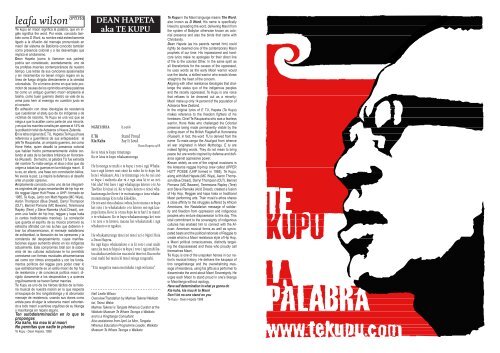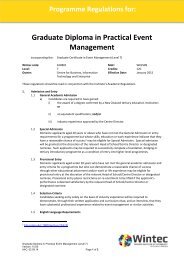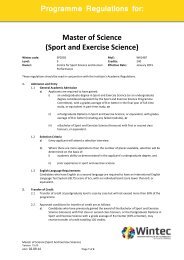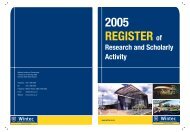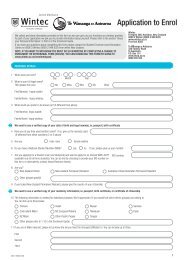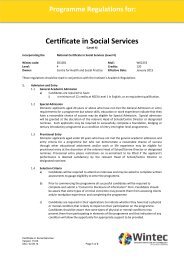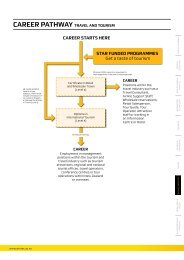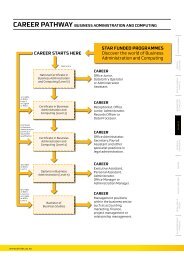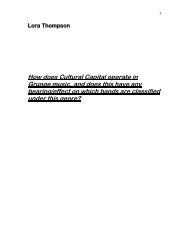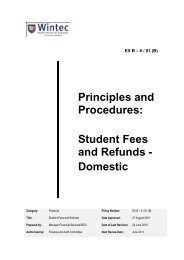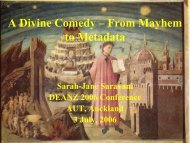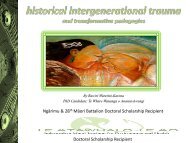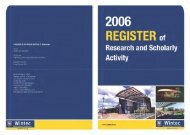aotearoa liberators - Wintec Research Archive
aotearoa liberators - Wintec Research Archive
aotearoa liberators - Wintec Research Archive
- No tags were found...
You also want an ePaper? Increase the reach of your titles
YUMPU automatically turns print PDFs into web optimized ePapers that Google loves.
leafa wilson artistaTe kupu en maorí significa la palabra, que en ingléssignifica the word. Por ende, conocido tambiéncomo D Word, su nombre está estrechamenteligado a la difusión del mensaje pronunciado enmaorí del sistema de Babilonia conocido tambiéncomo presencia colonial y a las desventajas queimplicó el cristianismo.Dean Hapeta (como lo llamaron sus padres)podría ser considerado, acertadamente, uno delos profetas maoríes contemporáneos de nuestrotiempo. Las letras de sus canciones apasionadasy sin miramientos no tienen ningún reparo en sulínea de fuego dirigida directamente a la otredadcolonialista. En el mismo ánimo en que todo promotorde causas de los oprimidos emplea palabrastal como un antiguo guerrero maorí emplearía eltaiaha, como buen guerrero diestro se vale de suarma para herir al enemigo en cuestión justo enel corazón.En adhesión con otras ideologías de resistenciaque cuestionan el statu quo de los indígenas y devíctimas de racismo, Te Kupu es una voz que seniega a que lo acallen como parte de una minoría,y es que los maoríes constituyen apenas el 14% dela población total de Aotearoa o Nueva Zelanda.En la letra original de E TU, Hapeta (Te Kupu) hacereferencia a guerrilleros de sus antepasados: eljefe Te Rauparaha, un arrojado guerrero, así comoHone Heke, quien desafió la presencia colonialque habían hecho permanentemente visible cortandoel asta de la bandera británica en Kororareka(Russell). De hecho, la palabra TU fue extraídadel nombre Tu-mata-uenga, el atua o dios que dioorigen a todas las guerras en la mitología maorí. Etu es, en efecto, una frase con connotación bélica.No evoca la paz. La inspira la defensa y el desafíoante un poder opresivo.Ampliamente conocido como uno de los integrantesoriginales del grupo neozelandés de hip hop estiloreggae Upper Hutt Posse -o UHP- formado en1985, Te Kupu, junto con Matt Hapeta (MC Wiya),Aarón Thompson (Blue Dread), Darryl Thompson(DLT), Bennet Pomana (MC Beware), TeremoanaRapley (Tere) y Steve Rameka (Acid Dread), crearonuna fusión de hip hop, reggae y kapa haka(o cantos tradicionales maoríes). La correlaciónque guarda el espíritu de su música promovió suestrecha afinidad con las luchas que debieron librarlos afroamericanos, el mensaje rastafarianode solidaridad, la liberación de los opresores y laconstancia del desposeimiento, cuyas manifestacionessiguen surtiendo efecto en los indígenasactualmente. Este compromiso total con la soberaníade las culturas autóctonas le ha permitidoconectarse con formas musicales afroamericanasasí como con ritmos sincopados y con los fundamentospolíticos del reggae para poder crear loque estilísticamente es un estilo maorí de hip hopde resistencia y de conciencia política maorí, dirigidoclaramente a los desposeídos y a quienesorgullosamente se hacen llamar maoríes.Te Kupu es uno de los héroes tácitos de la historiamusical de nuestra nación en lo que respectaal kaupapa de tino rangatiratanga y al abrumadormensaje de resistencia, usando sus dones comoartista para divulgar la soberanía maorí exhortandoa todo maorí a sentirse orgulloso de su tikangao maoritanga sin reparo alguno.Ten autodeterminación en lo que tepropongasKia kaha, kia mau ki al maoríNo permitas que nadie te pisoteeTe Kupu - Dean Hapeta, 1988DEAN HAPETAaka TE KUPUNGĀTI HUIA b.1966E TūKia KahaKo te Atua te kupu tīmatangaKo te Atua te kupu whakamutungaStand ProudSay It LoudDean Hapeta 1988He hononga te mahi o te kupu; i roto i ngā Whakatauo ngā kōrero mai rānō ka noho ko te kupu heihere i whakaaro. Atu i te tīmatanga o te Ao nei anōte kupu i waihotia ake rā e ngā atua ki te ao nei.Hei aha? Hei here i ngā whakapapa kōrero o te AoTawhito ki tēnei rā. Ko te kupu kōrero o tēnei whakaaturangahei here i te wairuatanga o tona whakamaramatangaki te taha kikokiko.He reo anō tōna ahakoa i whea, ko te mana o te kupukei roto i te whakatakoto o te kōrero mō ngā kaupapakatoa. Ko te ia o taua kupu ko te hari i te maurio te whakaaro. Ko te kupu whakamutunga kei rotoi te rere o te kōrero, maana hei whakatutuki i ngāwhakaaro o te ngakau.He whakaaturanga tēnei nō tēnei uri o Ngāti Huiaa Dean Hapeta.Ko ngā kupu whakatakoto e ia ki roto ī enei mahiaana; ka taea te hāpai o te kupu i roto i ngā mahi katoaahakoa tawhito tae noa atu ki tēnei rā. Kua nohoēnei mahi hei tauira ki tēnei reinga rangatahi.“E tū rangatira mana motuhake i ngā wā katoa”Na0 Leafa WilsonOverview/Translation by Mamae Takerei WaikatoIwi, Tainui WakaMamae Takerei is Tangata Whenua Curator at theWaikato Museum Te Whare Taonga o Waikatoand is a Kingitanga Consultant.Also assistance from April Le Mon, TangataWhenua Education Programme Leader, WaikatoMuseum Te Whare Taonga o WaikatoTe Kupu in the Maori language means The Word,also known as D Word. His name is specificallylinked to spreading the word, delivering Maori fromthe system of Babylon otherwise known as colonialpresence and also the binds that came withChristianity.Dean Hapeta (as his parents named him) couldrightly be deemed one of the contemporary Maoriprophets of our time. His impassioned and hardcorelyrics make no apologies for their direct lineof fire to the colonial Other. In the same spirit asall liberationists for the causes of the oppressed,he uses words as the early Maori warrior woulduse the taiaha, a skilled warrior who exacts blowsstraight to the heart of the concern.Aligning with other resistance ideologies that challengethe status quo of the indigenous peoplesand the racially oppressed, Te Kupu is one voicethat refuses to be drowned out as a minority;Maori make up only 14 percent of the population ofAotearoa New Zealand.In the original lyrics of E TU, Hapeta (Te Kupu)makes reference to the freedom fighters of hisforebears, Chief Te Rauparaha who was a fearlesswarrior, Hone Heke who challenged the Colonialpresence being made permanently visible by thecutting down of the British Flagstaff at Kororareka(Russell). In fact, the word TU is derived from thename Tu-mata-uenga the Atua/god from whenceall war originated in Maori Mythology. E tu areindeed fighting words. They do not mean to bringpeace but are words inspired by defense and defianceagainst oppressive power.Known widely as one of the original musicians inthe Aotearoa reggae hip-hop crew called UPPERHUTT POSSE (UHP formed in 1985), Te Kupu,along with Matt Hapeta (MC Wiya), Aaron Thompson(Blue Dread), Darryl Thompson (DLT), BennetPomana (MC Beware), Teremoana Rapley (Tere)and Steve Rameka (Acid Dread), created a fusionof Hip Hop, Reggae and kapa haka or traditionalMaori performing arts. Their music’s ethos sharesa close affinity to the struggles suffered by AfricanAmericans, the Rastafarian message of solidarityand freedom from oppression and indigenouspeoples who endure disposession to this day. Thistotal commitment to the sovereignty of indigenouscultures has enabled him to connect with the African-American musical forms as well as syncopatedbeats and the political rationale of Reggae tocreate what is a Maori resistance style of Hip Hop,a Maori political consciousness, distinctly targetingthe dispossessed and those who proudly callthemselves Maori.Te Kupu is one of the unspoken heroes in our nation’smusical history. He delivers the kaupapa oftino rangatiratanga and the overwhelming messageof resistance, using his gifts as a performer todisseminate the word about Maori Sovereignty. Heurges each Maori to stand proud in one’s tikangaor Maoritanga without apology.Have self determination in what ya gonna doKia kaha, kia mau ki to MaoriDon’t let no-one stand on youTe Kupu - Dean Hapeta 1988


